Collaboratory update July 2022 | Colombia
News and updates from our Colombian colleagues
29 July 2022
Agroecology is sustainable farming that works with nature, the application of ecological concepts and principles in farming, considering the bigger picture of relationships between plants, animals, people, and their environment. Earlier this year our Colombia Collaboratory launched their newly formed Agroecology course, developed as part of the Hub’s Rapid Response Fund (RRF) projects. The course successfully came to a close last month at an event held in the municipality of Silvia, Cauca. Campesino and indigenous communities of the Upper Cauca River Basin came together for an enriching final session, participating in the co-creation of an agricultural seed calendar and a seed and produce exchange. In a farmer-to-farmer exchange the communities shared and discussed new varieties that could be cultivated within their territories, whilst also sharing information about their own sustainable farming practices. Following great success and feedback on the programme, the Colombia team will continue an extended version of the course in collaboration with the SHARE project over the next few months, and there are plans for a future community knowledge exchange event and barter fair later in the year.
Our Colombian team has recently held a nature-based solutions course, where participants could explore the viability, efficacy, and sustainability of solutions in local, regional, and national contexts. A variety of stakeholders from the departments of Valle and Cauca were brought together, forming new, important relationships whilst identifying specific problems in their regions, for example, water pollution and drinking water treatment. On their final day of the course, participants enjoyed an educational outing to the municipality of El Cerrito, in Valle del Cauca, to learn about the operation of the wastewater treatment plant. It is hoped that the course will provide key stakeholders with the knowledge, tools, and connections to support transitions to more sustainable solutions. "The course was a truly enriching experience that helped us open our eyes and minds to other alternatives" - Johana Ordoñez, course participant. Take a look at this video to find out more.
Understanding multiple water values is a cross-cutting theme, enmeshed throughout all aspects of the Hub’s work. Researchers in Colombia hosted the public webinar ‘Visions and Values about Nature, Water, and Society’, with guest speakers Vicky Azucena Muelas from the indigenous Kishu community in Cauca, Colombia; Roldan Muradian from the Universidade Federal Fluminense in Brazil; and Erik Gómez Baggethun from the Norwegian University of Life Sciences in Norway. The speakers explored how the values of water are connected to identifying risks and management practices, each sharing their own unique experiences. Realising the full social, economic, and environmental values of water security is crucial to better governance and decision making in the management of water. Watch the webinar here (in Spanish).
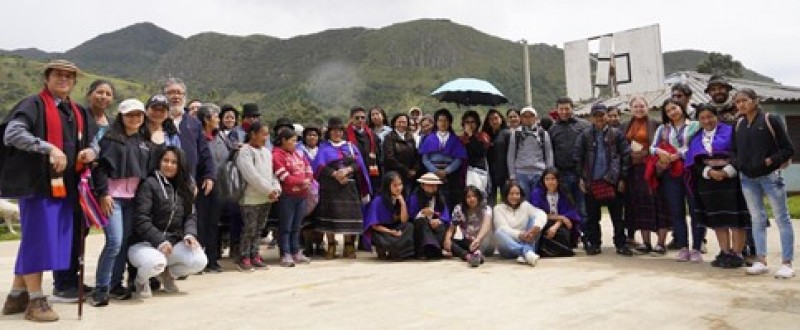
Agroecology course participants
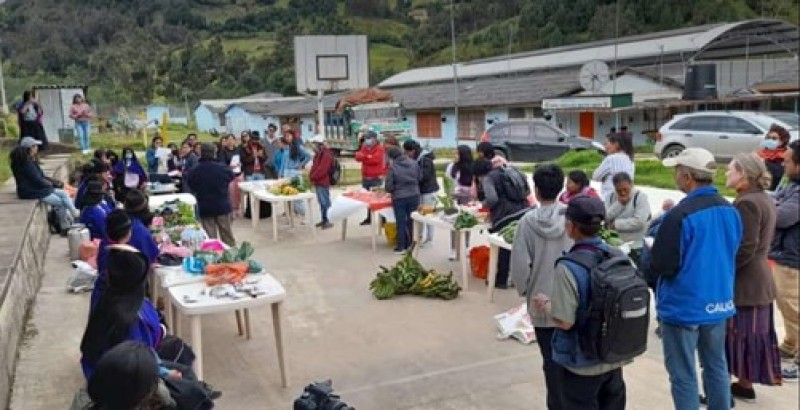
Agroecology course: seed, produce, and knowledge exchange
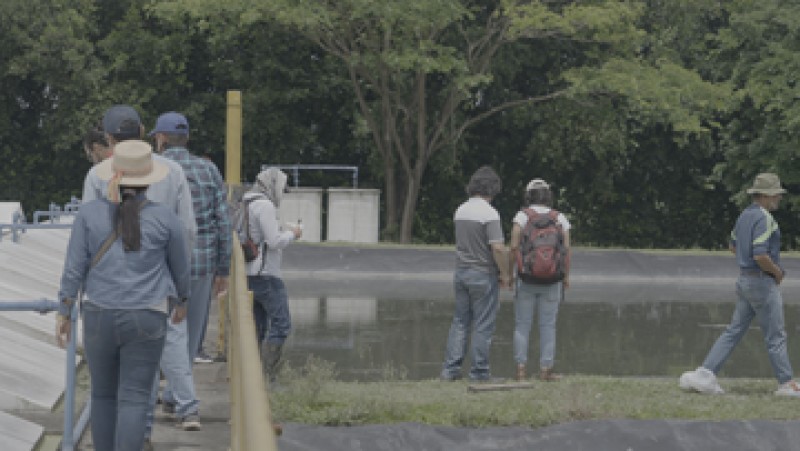
Participants in the nature-based solutions course
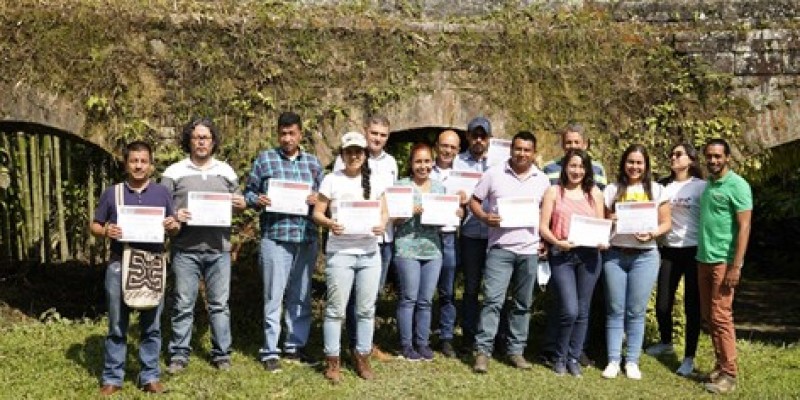
Participants in the nature-based solutions course
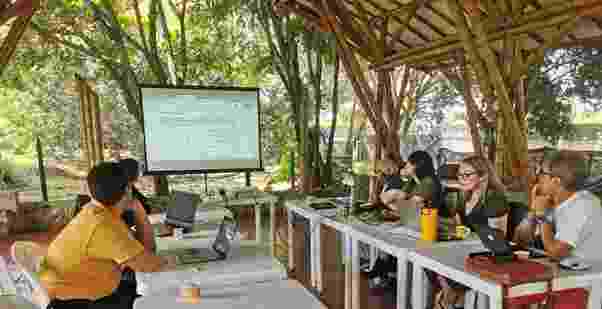

Additionally, the Universidad del Cauca and Universidad del Valle values teams recently came together for a water values workshop. Discussions were held on analysing water values from a holistic perspective, sociological systems analysis approaches, plural valuation, specific contexts of communities working with the Hub, and a recent literature review conducted in Latin America and Colombia. The teams have produced a document on the meanings and importance attributed to water that should be considered in water management processes.
Following its launch earlier this year, the PUDA project has got off to a great start with over 50 homes already visited and surveyed, and contact established with over 50 more households for further data gathering. The PUDA project is a research strand focused on the domestic uses of water in homes in the city of Cali, with the household survey designed to provide insights into the different ways water is used across different sectors of Cali, for example, washing clothes, bathing, using the toilet, washing hands, brushing teeth, and dishwashing.
The research team working in the Upper Meléndez River Basin has been exploring and using a photo-voice methodology to gather the perceptions of basin inhabitants about river and water security. A participatory methodology, ‘photo-voice’ captures expressions of a community’s visual individual and collective memory, and creates space for reflecting a community’s meanings, history, and political vision. A public exhibition of the photo-voice collection is being planned to take place in the agroecological campesino market of the Upper Meléndez River Basin.

PUDA project data collection progress

Photo-voice research in the Upper Meléndez River Basin

Photo-voice research training, in the Upper Meléndez River Basin

Photo-voice research in the Upper Meléndez River Basin
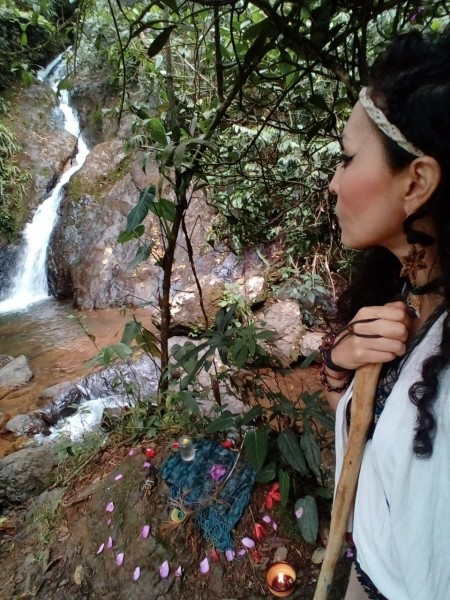
Guardians of the river gratitude ritual in the Upper Meléndez River Basin

University of Leeds visit to Tecnicafe, Colombia
The lifting of travel restrictions has allowed our global team to come together once again. A cross-Hub group of researchers based in Colombia and at the University of Leeds are working together on MUISKA - a MUltidimensional rISK Assessment. MUISKA is an approach to assess water security risks, incorporating water values and governance as key factors affecting risk analysis. The team is initially using the method to identify water quality and quantity hazards, analysing their consequences from a systems perspective across dimensions of health and wellbeing; infrastructure and associated services; economy and productivity; ecosystem services; and culture, justice, and peace. MUISKA also incorporates reviews of final outputs of risk management actions, allowing greater understanding of whether actions may create additional hazards or risks, or increase/decrease the level of existing risks. Leeds researchers recently joined colleagues in Colombia for workshops and discussions exploring local applications of MUISKA, planning future field work around water risks, and a field trip to Tecnicafe to learn the ins and outs of coffee production.
Finally, our Colombia Collaboratory has begun sharing a monthly newsletter in Spanish, to update stakeholders on monthly activities, research, and events. Find out more on the Collaboratory Facebook page.
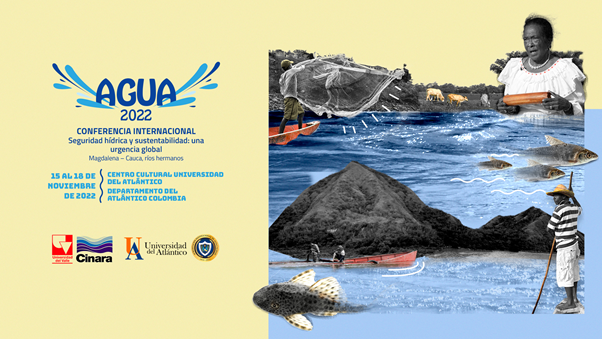

The Colombia Collaboratory invites you to share your research at the 'AGUA 2022' INTERNATIONAL CONFERENCE: A GLOBAL EMERGENCY MAGDALENA-CAUCA, SIBLING RIVERS
15-18 November | Barranquilla, Colombia
AGUA, organised by the Cinara Institute of the Engineering Faculty of the Universidad del Valle since 1996, as a biennial academic, scientific and social event aimed at presenting and discussing advances, developments, research, initiatives, experiences and lessons learned, in the field of water, in all its dimensions, at the international, regional, national and local levels, reaches its twelfth version. The International Conference will be held on 15 November, in collaboration with the Universidad del Atlántico. It's central theme is Water Security and Sustainability: A global emergency Magdalena-Cauca, Ríos Hermanos.
Find out more: www.eventoaguacinara.com
Get in touch: eventoagua.cinara@correounivalle.edu.co



